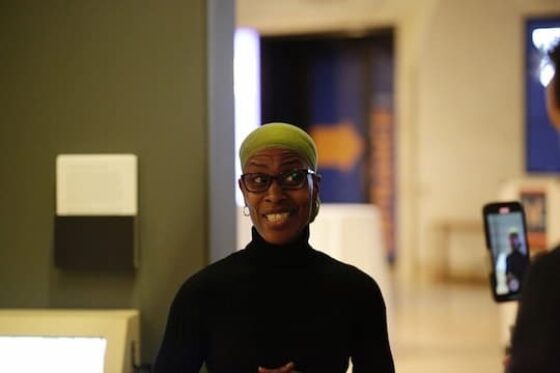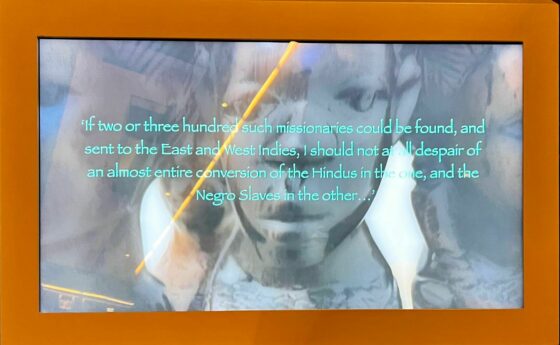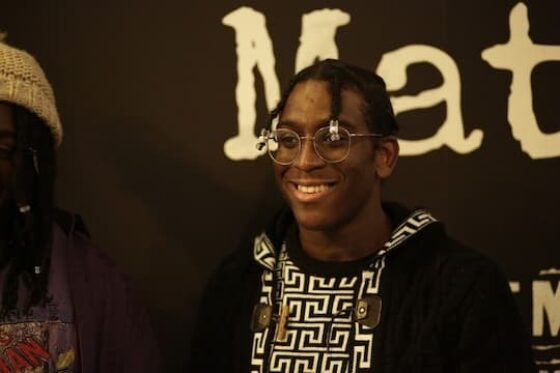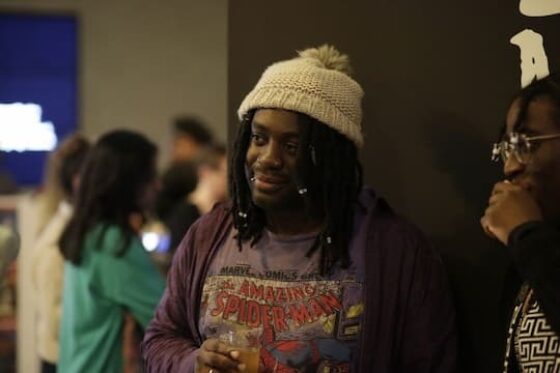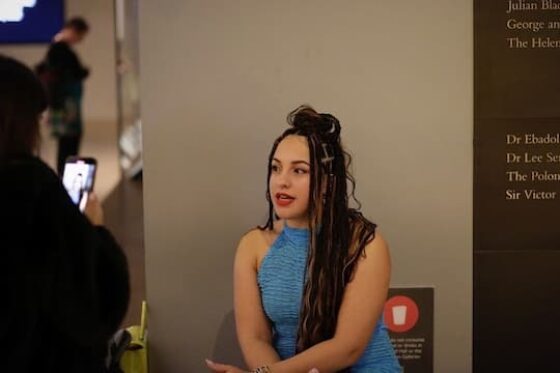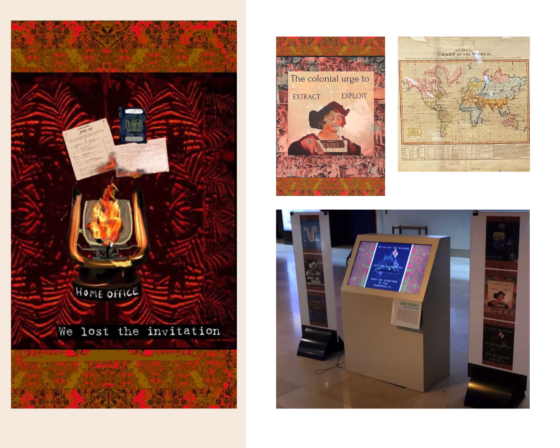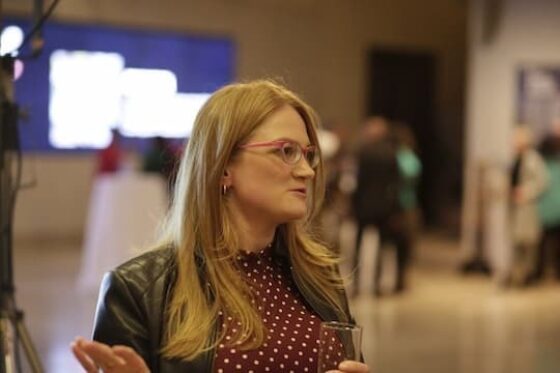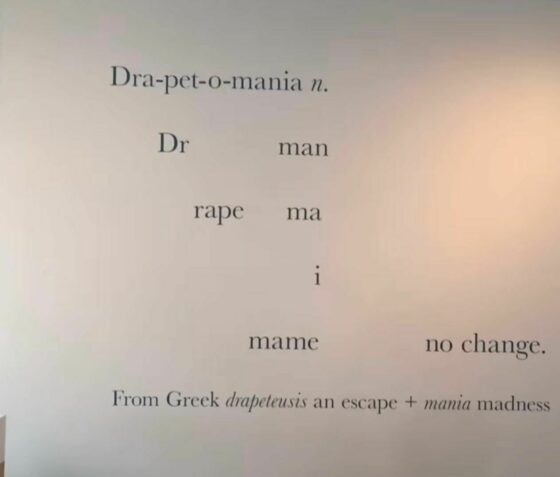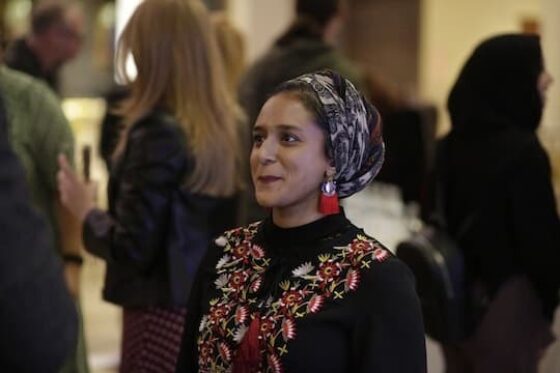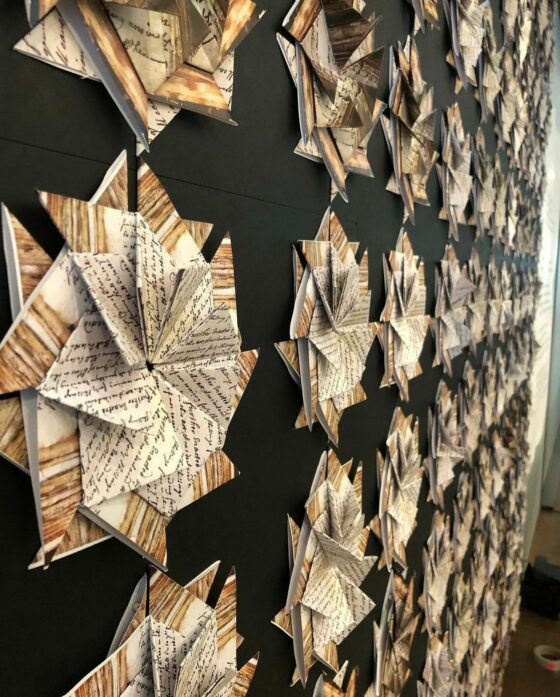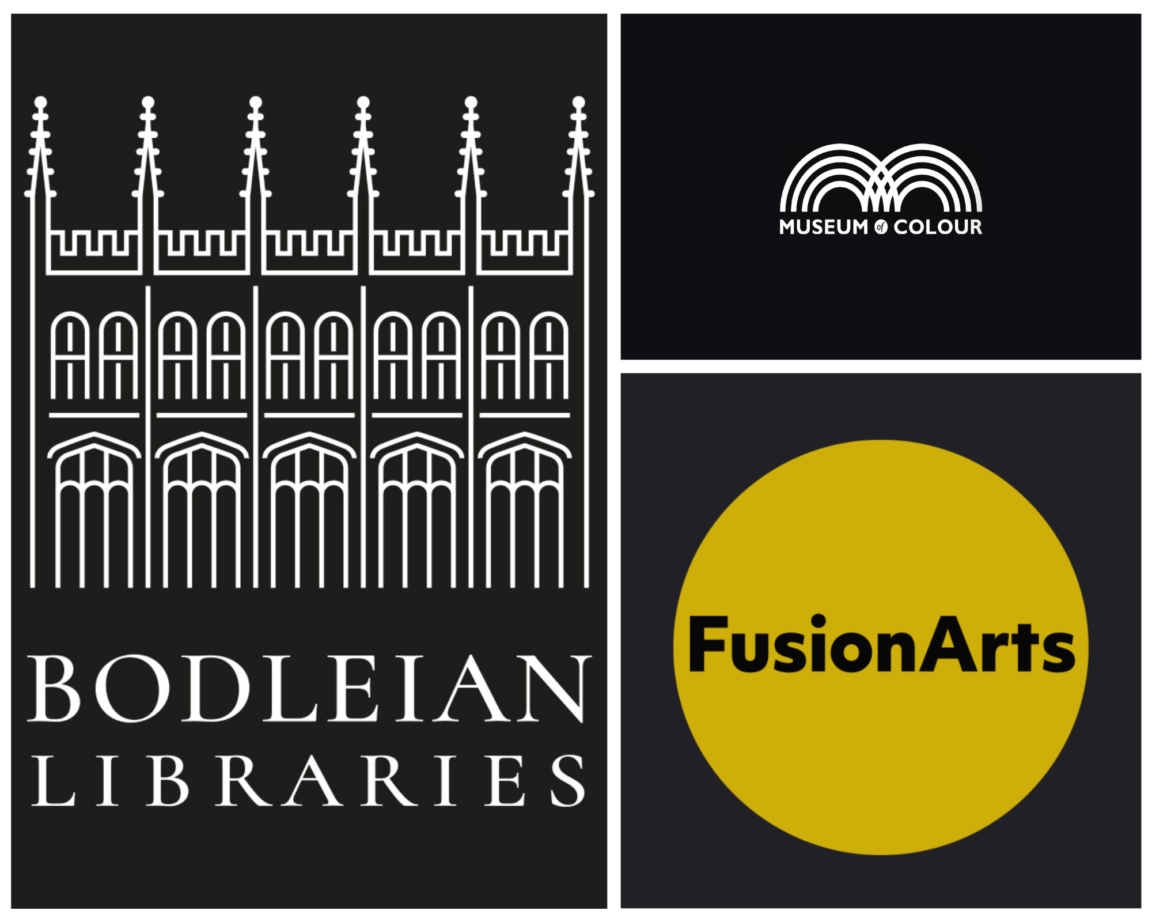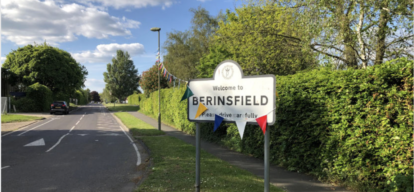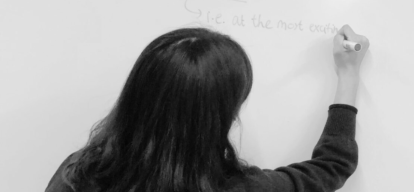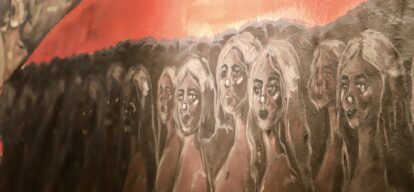
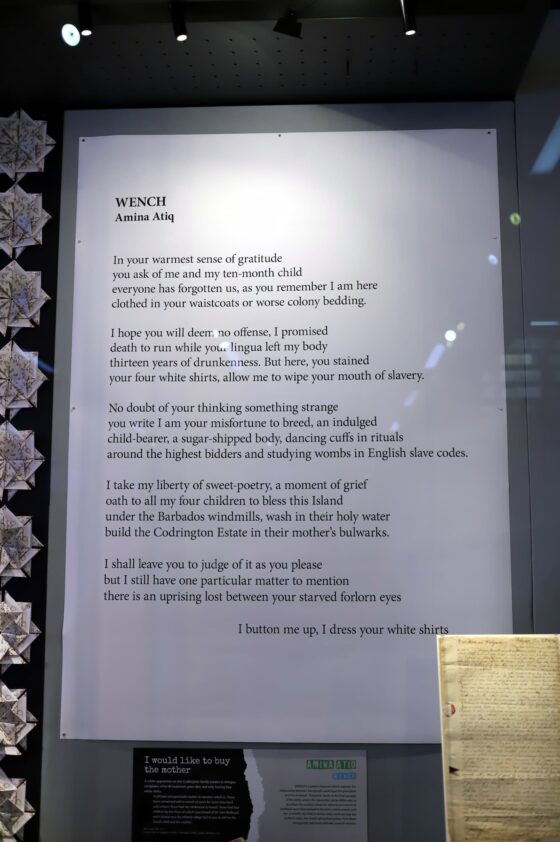
13/02/2023
Months ago in November, These Things Matter, a partnership between Museum of Colour, Bodleian Libraries and Fusion Arts, launched together a small exhibition through a collaborative process featuring six objects relating to slavery and empire, and six contemporary responses created by artists.
In October and November 2021, community members were facilitated by curators and researchers from the Bodleian Libraries and Museum of Colour to choose objects that would form the foundation of this exhibition and the subjects of this artistic commission. Participants were encouraged to engage with the material, ask questions, discuss and then decide. The objects and items chosen by participants through this series of workshops are to be used for inspiration for the exhibition: to make small shifts in decision making power and explore how it feels for all involved.
This co-curated exhibition presents six examples of colonial material from the Bodleian collections that, in a variety of ways, normalise oppression based on assumed racial superiority. Among these, and inspiring the project, is a censored version of the King James Bible, commonly known as the ‘Slave Bible’, which was made to teach a pro-slavery Christianity to enslaved people. Following a process of public workshops, seven artists were commissioned to reflect on the selected exhibits, and to use their creativity to open up perspectives on historic materials that engineer psychological domination. The exhibition calls you to consider the ways in which our thinking has been framed by our predecessors, and present behaviour informed by activity beyond these shores. In a land that prides itself on civility, these things matter.
Seven artists were commissioned to reflect on the selected exhibits, and to use their creativity to open up perspectives on historic materials that engineer psychological domination.
Amina Atiq is a Yemeni poet, performance artist, creative- cultural practitioner and award-winning community activist. She is an anti- racism advisory member with Curious Minds, Artist Fellow at DaDaFest and Social Cohesion Fellow Alexander von Humboldt Foundation Residency 2022.
Artwork for These Things Matter:
Wench
Wench is a poetic response which explores the relationship between free people working at the plantation and the enslaved. The poem reacts to the final passage of the letter, where the apprentice James Millet asks to purchase the mother, whom he refers to as a wench (a medieval word that evolved to become a racist smear), and her 10-month old child. In Amina Atiq’s work we hear the mother’s voice, her words taking back power from these misogynistic and racist attitudes towards women.
Amina Atiq reads her poem Wench – This poem is featured in TTM exhibition, on display at the Weston Library.
Bunmi Ogunsiji is a re-emerging British-Nigerian writer living in London. Exploration of Heritage and the ‘troublesome’ intersection of race, age and gender are at the heart of her creative practice.
Artwork for These Things Matter:
And There Was Disquiet at The God’s Table
In Bunmi Ogunsi's work. a proud Nigerian and devout Christian encounters the Rev. Bellby Porteus, founder and president of the Society for the Conversion and Religious instruction and Education of Negro Slaves in the British West India Island (the society responsible for the Slave Bible and shares with him a few home truths regarding the inevitability of their meeting and the role of Christianity and colonialism in the construction of his neo-colonial African identity. This piece speaks to the alchemy of endurance and is a deeply personal reflection on now a religion imposed has been reshaped and renamed by the colonised and enslaved to honour those things that simply refuse to die.
Dirty Freud are an electronic live and recording outfit who met in Niche Sheffield, then moved into the bassline scene. They found success after moving back to the North of England. The music contains elements of dubstep, 2-step garage, bassline. It is simply Dirty Cinematic Electronica.
Artwork for These Things Matter:
Letters from The Lost & Found
'Enjoy the journey as we take you from the past to our present'. Dirty Freud and Chris Skerritt chose to make an audio-visual response to the assumption and fear which resonate in these letters. Their work encapsulates what the letters inspired in them and why they felt it was important to showcase this.
Grace (SOME.GAL) is a multidisciplinary artist and Digital Art Curator from Sheffield. Her practice is experimental; incorporating mixed media including painting, animation, costume, video, sound design and installation. Grace has a desire to create work which honours figures and narratives hidden from the mainstream.
Artwork for These Things Matter:
Explanation of The Colonial Urge.
Grace said: ''My response to the Clarks Charts Map of the world became a visual essay of my investigation into different elements of the map and its creation. I wanted to delve into the mindset of those labelling the land and the construction of identities arising from this map. How colonisation starts in the imaginings of the maps creators, in building upon the mythology of whiteness' as a symbol of civilisation and superiority. This mythology with its refashioned associations to Christianity, has created and legitimised unequal power relationships which are made to appear natural, within the history of colonialism and the commonwealth. Also, how these are continually constructed into the present in new but similar ways, in determining the value of certain populations''.
In asking who defines the savage but has permission to act savagely? Grace declared: ''I am speaking to how the identities of POC people were and are continually examined under the microscope of this colonial anthropological mindset, and I sought to apply this lens back on the mindset of the creator of the Clarks Map''.
Johannah Latchem is a UK installation artist who completed her post-doctorate at Oxford University, and her PhD in Fine Art/Art History at Newcastle University. Her work responds to contentious historic artefacts in national institutional collections.
Artwork for These Things Matter:
Drapetomania’, named by the American physician Samuel Cartwrite in the New Orleans Medical and Surgical Journal, 1851, was a form of mania supposedly affecting enslaved people in the 19th century: an uncontrollable impulse to run away from their white enslavers, preventable by whipping, This work addresses how the word perpetuated the system of enslavement by legitimising it through a medical term, conditioning thinking across the wider population, and pathologising the human subject. It resonates with 20th-century instances of individuals wrongly consigned to asylums, sometimes for no legitimate reason, and raises questions of what maintains these systems.
Mahdy Abo Bahat is a UK-based Egyptian artist-filmmaker with a practice rooted in installations and found objects. His work aims to summon ghosts of the repressed past and future against the dreamworks of colonialism.
Artwork for These Things Matter:
Portal-Jubiloo Grave Good for Major – General John Murray
What if there were an object - a portal - that could collapse and then converge two moments in history: the aftermath of the Platinum Jubilee in 2022. and the aftermath of a slave insurrection in 1823? What it witness accounts were told by objects surrounding us? What if colonialism was not just a history. but a symptom of an illness swelling on the remains of British culture? This work is a 'grave good' and a votive deposit for Major-General John Murray, the Governor whose forces suppressed the Demerara revolt. May it shake his slumbers in colonial paradise.
Nilupa Yasmin is an artist and educator. She explores the principles of art and craft and is interested in the notion of culture, self-identity, and anthropology in her practice.
Artwork for These Things Matter:
They and Their Children are Slaves
Nilupa Yasmin wants her work to make you uncomfortable, because nothing about this should make you feel anything less than indignation. Her photographic sculpture brings together intricately folded pages filled with heinous words. While we are drawn to the beauty in these creases, they also expose the ill treatment of enslaved peoples and the harsh reality of our collective history.
Nilupa Yasmin said: ‘’ My piece 'they and their children are slaves' is inspired by 'Act for the better ordering of slaves' - The South Carolina legislation which shows the regime of punishment and judicial killing imposed to maintain power by White people over enslaved Black people and Native Americans. This Act was only one in a long line of legislative measures, renewed frequently, imposing these regulations. The 1701 text had disappeared from historical records by the 19th century, but a single known copy survives, bound into a collection of manuscripts at the Bodleian Library.’
Fusion Arts work with artists, groups and communities from across Oxfordshire and beyond to support a variety of imaginative and socially engaged projects.
Working with communities in Berinsfield and Didcot
Creative writing workshops for young people in Oxfordshire and beyond.
Exploring Climate Change Through the Eyes of Indigenous Farmers in Indonesia. A collaborative project with Soboman Artspace 219 in Yogyakarta.
